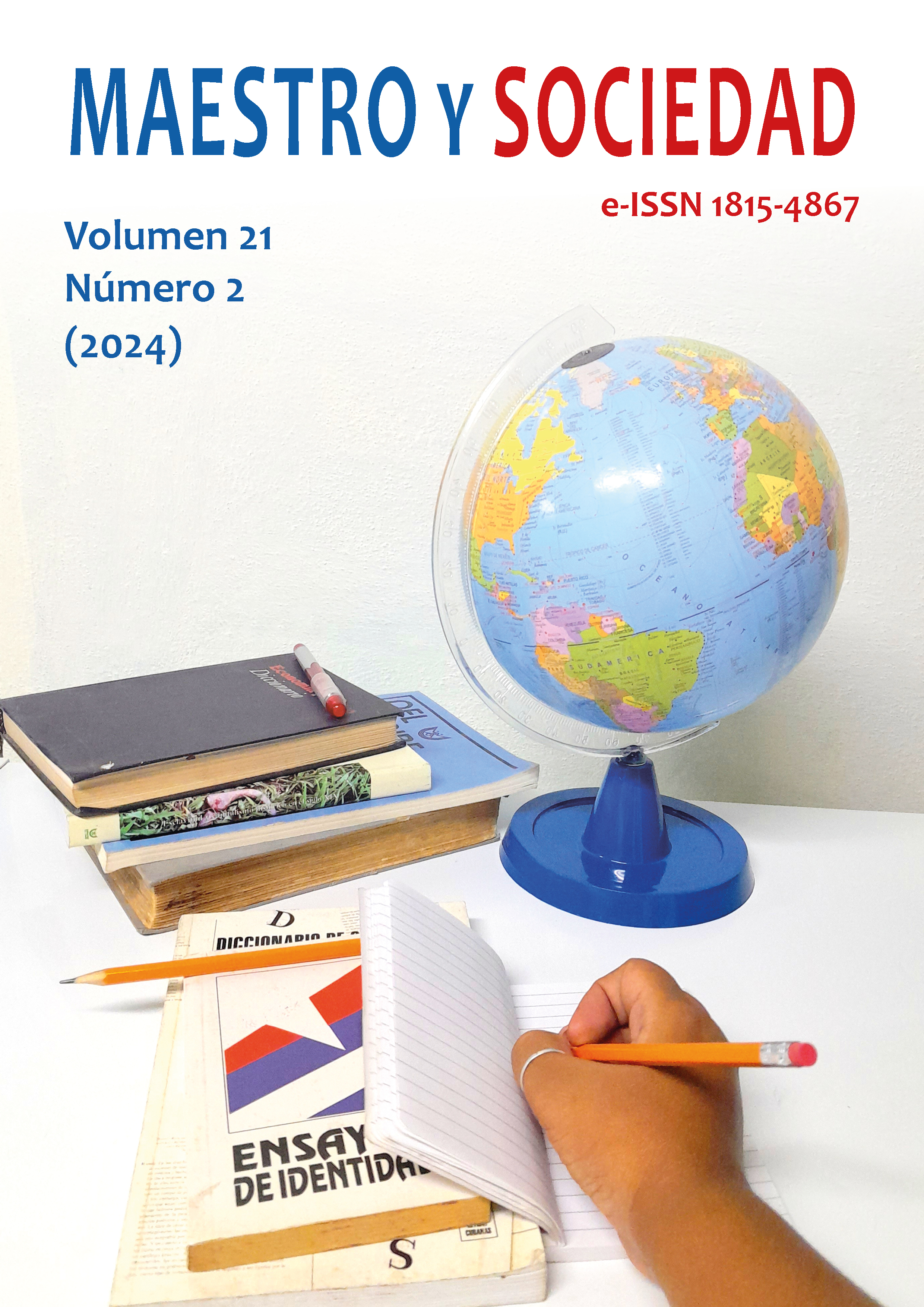The importance of teaching the English language in the development of communication and linguistic competencies in the field of Law
Keywords:
linguistic skills, communication skills, English, law career, importanceAbstract
Introduction: With the evolution of the world and the different needs of students, different interdisciplinary relationships have arisen. Currently, with globalization and standardization worldwide, the English language is considered “the lingua franca” and is considered the official language of world communication and that is why it has become considered TEFL (Teaching English as a Foreign Language). to TESL (Teaching English as a Second Language). Objective: to collect contextual and bibliographic information in the area of law regarding the teaching of English and its influence on the development of communicative and linguistic skills in future lawyers who not only learn to speak in English but also know how to speak in public, knowing how to reach an audience with a message, in other words, selling your profession. Materials and Methods: Qualitative methodology and descriptive study were used to analyze the need to study the English language in law school. Results: The purpose is to make students aware of the consideration of learning this language, which already has great preponderance worldwide, not only as a means of communication but as a promoter of the development of creativity and other critical thoughts to be developed, in addition to the consideration knowing how to communicate and speak in front of an audience with great solvency, not only linguistically but also persuasively communicative. Discussion: Unquestionably, the support that learning a language gives to the training of a lawyer is immense, one of the approaches used for teaching a language, perhaps with the greatest number of techniques or strategies for the development of communicative and linguistic skills. Neurolinguistic Programming has them. Conclusions: In an increasingly globalized world, the teaching of English in law studies is essential due to the growing internationalization of legal practice and the need to communicate with clients, colleagues and courts in an international environment.
References
Abd Rahman, S. N., Abd Samad, A., Razali, A. B., & Jeyaraj, J. J. (2022). Developing Sociolinguistic Competence in the ESL Classroom: A Case Study of ESL Instructors in a Malaysian University. Asian Journal of University Education, 18(4).
Betti, M. J. (2021). Applied Linguistics. https://www.researchgate.net/publication/348627973_Applied_Linguistics
Cruz Rivera, Y. D., Urbano Gutiérrez, P. L., Castagnola Rossini, M. G., & Pérez Azahuanche, A. M. (2022). El Aula Invertida y su Influencia en la Enseñanza-Aprendizaje. Academia Journals, 14(6), 222. https://www.researchgate.net/publication/364640664_El_Aula_Invertida_y_su_Influencia_en_la_Ensenanza-Aprendizaje/link/635465c48d4484154a240aa7/download
Mirusmanovna, M. M. (2020). Discursive Competence and Its Role in Teaching Oral Speech. International Journal of Academic Pedagogical Research (IJAPR), 4(12), 46-48.
Sánchez Freire, J. V., & Pérez Barral, O. (2020). Communicative Approach in the Teaching-Learning Process of English as a Foreign Language: Enfoque Comunicativo en el Proceso de Enseñanza-Aprendizaje del Inglés como Lengua Extranjera. Conciencia EPG, 5(2), 10.
Vigueras Moreno, J. A., & Velásquez Espinales, A. N. (2021). Neuro-linguistic programming in the teaching-learning process of English as a foreign language. Palarch’s Journal of Archaeology of Egypt/Egyptology, 18(4), 5573.
Arismendi Gómez, F. A. (2016). La competencia plurilingüe y pluricultural en la formación de futuros docentes de lenguas extranjeras en una universidad pública en Colombia. https://www.researchgate.net/publication/303896324_La_competencia_plurilingue_y_pluricultural_en_la_formacion_de_futuros_docentes_de_lenguas_extranjeras_en_una_universidad_publica_en_Colombia
Balykin, I., & Balykina, L. H. (2021). Selecting Innovative Approaches to Teaching English to Law Students Via Questionnaire Analysis. Advances in Economics, Business and Management Research, 170, 168-173.
Boikanyo Ntereke, B., & Ramoroka, B. (2017). Reading competency of first-year undergraduate students at University of Botswana: A case study. Reading & Writing, 8(1), 3-11. https://doi.org/year_undergraduate_students_at_University_of_Botswana_A_case_study
Cestero Mancero, A. M. (2006). La Comunicación no Verbal y e l Estudio de su Incidencia en Fenómenos Discursivos como la Ironía. ELUA Estudios de Lingüística Universidad de Alicante, 20, 2-21.
D¨Argenio, L. (22 de Diciembre de 2022). Teaching Critical Thinking Skills in the ESL Classroom. Teaching Critical Thinking Skills in the ESL Classroom. https://bridge.edu/tefl/blog/teaching-critical-thinking-skills-esl-classroom/
Danping, W. (2014). English in the Chinese Foreign Language Classroom. https://www.researchgate.net/publication/347498437_English_in_the_Chinese_Foreign_Language_Classroom
Fisenko, O., Belous , A., Vukolova, E., & Sycheva Irina. (2021). Developing grammatical competence at the stage of pre-higher education training. Propósitos y Representaciones, 9(2), 6-9. https://files.eric.ed.gov/fulltext/EJ1299115.pdf
Little, D. (2006). The Common European Framework of Reference for Languages: Content, purpose, origin, reception and impact. Language Teaching, 39(03), 168-169.
Lovert, O. (29 de marzo de 2020). LIve and invest Overseas. LIve and invest Overseas. https://www.liveandinvestoverseas.com/lifestyle/best-places-to-retire-in-south-america-salinas-ecuador/
Mead, A , N., Rubin, & Donald , L. (1985). Assessing Listening and Speaking Skills. ERIC. 3. https://eric.ed.gov/?id=ED263626
Merino, S. P., Poveda, M. P., Arteaga, S. B., & Poveda, M. P. (2019). Realidad actual de la enseñanza en inglés en la educación superior de Ecuador. Dominio de las Ciencias, 5(2), 526-530.
Mustafoeva, N., & Krimpas, P. G. (2022). The importance of improving writing competence in teaching English to students in higher education. International Journal of Early Childhood Special Education, 4, 3749-3783.
Rababah, G. A. (2002). Strategic Competence and Language Teaching. https://eric.ed.gov/?id=ED472697
Sandamali, S. (2020). Importance of Multilingualism in Academic Performance among the English as Second Language Learners. https://www.researchgate.net/publication/349162279_Importance_of_Multilingualism_in_Academic_Performance_among_the_English_as_Second_Language_Learner
Published
How to Cite
Issue
Section
License
Copyright (c) 2024 Luis Alberto Iza Espinoza, Geovanny Bolívar Suarez Lindao, Lady Diana Cun Lucumi, Marjorie Katerine Merejildo Cruz

This work is licensed under a Creative Commons Attribution-NonCommercial-NoDerivatives 4.0 International License.
This journal provides immediate open access to its content, based on the principle that offering the public free access to research helps a greater global exchange of knowledge. Each author is responsible for the content of each of their articles.



























 Universidad de Oriente
Universidad de Oriente 